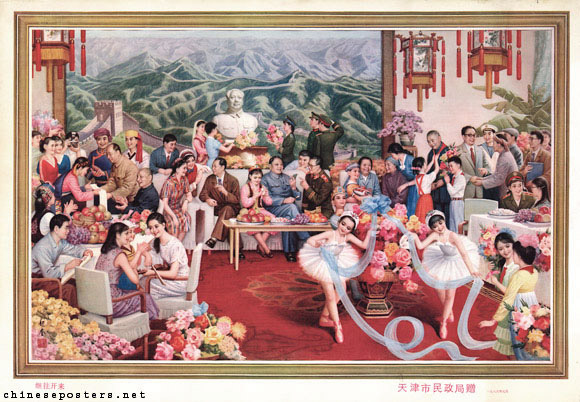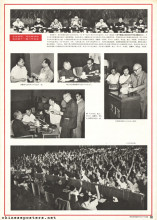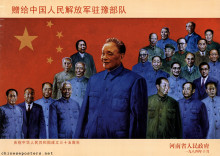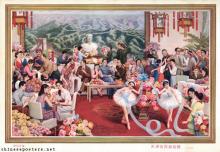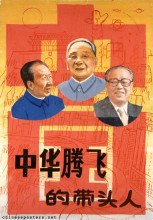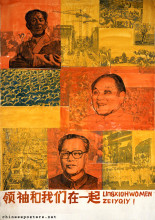Detail from poster ‘Carry Forward the Revolutionary Cause and Forge Ahead into the Future’, 1986
Hu Yaobang (胡耀邦, 1915-1989) was considered the most reform-minded member of the post-Mao leadership. Nothing was sacred to him: he once suggested that the Chinese refrain from eating with chopsticks to avoid the spreading of disease; and he considered none of Mao’s thoughts applicable to China’s efforts to modernize. Such startling statements did not endear him to his more conservative colleagues.
After running away from home at the age of 14, he joined the Communist Party. Hu was one of the youngest participants in the legendary Long March (1934-1935). Later he joined the People’s Liberation Army, where he served as a political officer under Deng Xiaoping. From that point on, his career was closely linked with Deng’s. After the founding of the PRC in 1949, he followed Deng to Peking, where he became the head of the Communist Youth League. When Deng was purged in 1966, Hu shared the same fate. When Deng was restored to power in 1973-1976, Hu reappeared. The pattern was repeated in 1976-1977.
Carry Forward the Revolutionary Cause and Forge Ahead into the Future, 1986
After Deng’s Four Modernization policy was adopted in 1978, Hu was named to the Politburo and made head of the organization and propaganda departments of the party. In 1982, he replaced Hua Guofeng as general secretary. In January 1987, after a number of secret meetings in which the conservatives played a major role in driving him out, Hu was forced to accept the responsibility for students demonstrations that took place in 1986. After his self-criticism and resignation, he went into seclusion, although he remained a member of the Politburo.
During a meeting of the Politburo in April 1989, Hu had a heart attack from which he did not recover. His death sparked the student demonstrations that ended with the Tiananmen Incident in June 1989: according to the students, with Hu dead, there was no hope for further (political) reforms.
The conservatives’ antipathy of Hu’s liberalism may be one of the reasons that no posters featuring him were ever published. A plan to publish a poster with Deng, Hu and Zhao Ziyang, was quietly shelved in 1989. The poster shown on this page, donated in 1986 to the civil administration of Tianjin, is one of the only ones known to show Hu, seated on the sofa with Deng. They are surrounded by a number of other leaders, including Chen Yun and Li Xiannian, and various models of the time, including Zhang Haidi.
Dachang Cong, When Heroes Pass Away - The Invention of a Chinese Communist Pantheon (Lanham MD, etc.: University Press of America, 1997)

